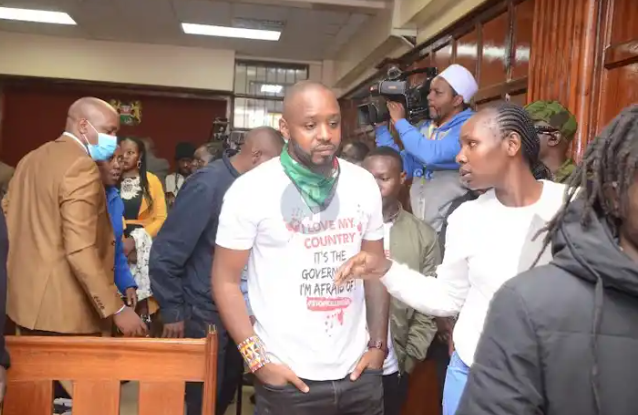Alinur Mohamed, a former MP aspirant, has taken to social media to make strong statements regarding the detention of activist Boniface Mwangi.
In a post on his X account, Mohamed declared that he and others are refusing to leave the Milimani Law Courts until Mwangi is released.
“We have refused to leave Milimani Law Courts until they release Boniface Mwangi. Court to make a ruling at 2 PM. We won’t tolerate these games,” he stated emphatically.
Earlier, Mohamed had provided updates from the court, shedding light on the unfolding situation.
“I am at the Milimani Law Courts with Boniface Mwangi. The government wants to detain him for 21 days because they don’t want him to interfere with witnesses.
They have refused to produce the said witnesses. Another excuse is that they want to do more investigations!” Mohamed explained.
According to Mohamed, the government’s justification for detaining Mwangi is questionable, as they have not presented any witnesses to substantiate their claims that Mwangi might interfere with them. He perceives the call for a 21-day detention as a tactic to keep Mwangi in custody without solid evidence.
This sentiment is echoed by many of Mwangi’s supporters, who are frustrated and determined to remain at the courthouse until he is freed.
Boniface Mwangi is a prominent activist known for his outspoken criticism of the government.
His detention has sparked widespread concern about freedom of speech and the right to protest in Kenya.
Supporters argue that the government’s move to detain him without presenting witnesses or clear evidence is a direct attack on these fundamental rights.
The atmosphere at the Milimani Law Courts is tense as supporters anxiously await the court’s decision at 2 PM.
Mohamed and others have vowed to stay put, insisting they will not leave until Mwangi is released. “We won’t tolerate these games,” Mohamed reiterated, underscoring their commitment to standing their ground and protesting against what they perceive as unfair treatment by the authorities.
The case has drawn significant attention, with many viewing it as a litmus test for the government’s stance on civil liberties and its treatment of dissenting voices.
Mwangi’s detention and the subsequent outcry highlight the ongoing struggle for freedom of expression in Kenya, a country that has seen numerous activists and journalists face similar challenges.
As the clock ticks towards the court’s ruling, the tension at Milimani Law Courts continues to mount.
Supporters of Mwangi, including Mohamed, are prepared for a prolonged protest if necessary.
They argue that detaining Mwangi without due process is a grave injustice and are determined to see him released.
The situation underscores the broader issues of judicial independence and government accountability in Kenya.
The outcome of this case will not only impact Mwangi’s immediate future but also set a precedent for how activists and dissenters are treated in the country.
The detention of Boniface Mwangi has brought to the forefront critical issues of freedom of speech and the right to protest in Kenya.
The steadfast stance of Alinur Mohamed and other supporters at the Milimani Law Courts reflects a broader call for justice and accountability.
The court’s decision will be pivotal in shaping the discourse around civil liberties in Kenya.





















Add Comment